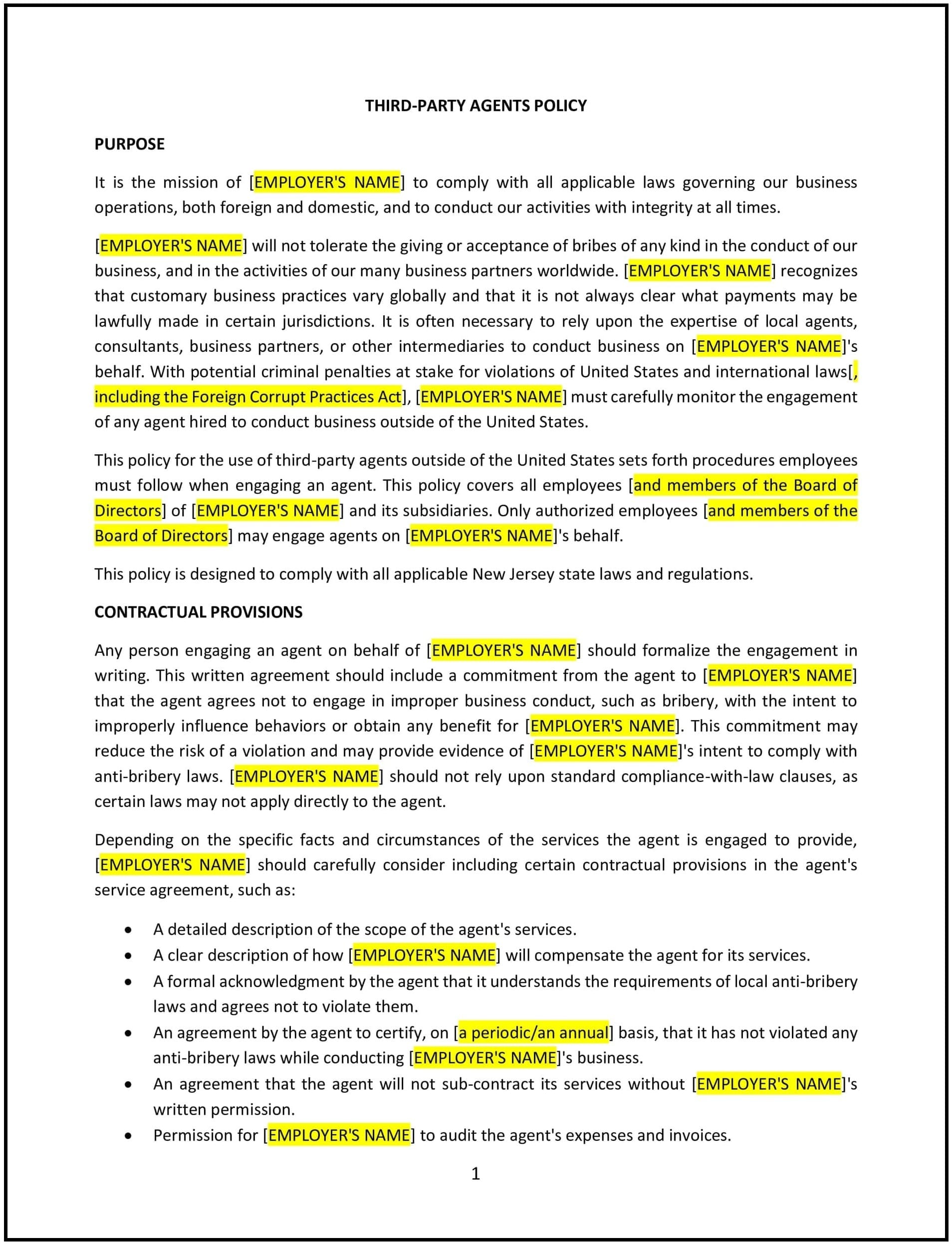Third-party agents policy (New Jersey): Free template
Got contracts to review? While you're here for policies, let Cobrief make contract review effortless—start your free review now.

Customize this template for free
Third-party agents policy (New Jersey): Free template
Third-party agents policy (New Jersey)
A third-party agents policy helps New Jersey businesses manage their relationships with external parties or agents, such as vendors, contractors, or consultants. This policy outlines how third-party agents should be selected, contracted, and monitored, ensuring that they align with the company’s values, legal obligations, and business objectives.
By adopting this policy, businesses in New Jersey can ensure that their relationships with third-party agents are transparent, professional, and support compliance with legal and ethical standards.
How to use this third-party agents policy (New Jersey)
- Define third-party agents: Specify what constitutes a third-party agent in the context of your business, such as vendors, contractors, consultants, or temporary staff.
- Outline the selection process: Provide guidelines for selecting third-party agents, ensuring that they meet necessary qualifications, legal requirements, and align with the company’s values and goals.
- Specify contractual terms: Establish the key terms to be included in contracts with third-party agents, including scope of work, payment terms, confidentiality, and compliance with applicable laws.
- Address monitoring and oversight: Outline the process for monitoring third-party agents’ performance to ensure they fulfill their contractual obligations and meet the required standards.
- Ensure confidentiality and data protection: Set guidelines to protect sensitive company information, intellectual property, and customer data when working with third-party agents.
- Define the termination process: Provide clear procedures for terminating contracts with third-party agents in cases of non-compliance or unsatisfactory performance.
- Review and update: Regularly assess the policy to ensure it reflects New Jersey regulations, business needs, and best practices for managing third-party relationships.
Benefits of using this third-party agents policy (New Jersey)
This policy provides several benefits for New Jersey businesses:
- Promotes transparency: Helps ensure that relationships with third-party agents are clear, professional, and aligned with company objectives.
- Reduces legal and financial risks: Ensures that contracts with third-party agents are legally sound and that agents fulfill their obligations in compliance with New Jersey and federal laws.
- Protects sensitive information: Establishes protocols to safeguard company data, intellectual property, and confidential information when working with third-party agents.
- Improves business relationships: Encourages clear communication and accountability between businesses and third-party agents, fostering positive and productive collaborations.
- Enhances operational efficiency: Streamlines the process of engaging with third-party agents, ensuring that business needs are met in a timely and efficient manner.
Tips for using this third-party agents policy (New Jersey)
- Communicate the policy clearly: Ensure that all employees, especially those involved in selecting or managing third-party agents, are aware of the policy and its guidelines.
- Conduct due diligence: Perform thorough background checks and evaluations to ensure that third-party agents meet the company’s standards and legal requirements.
- Maintain clear contracts: Ensure that contracts with third-party agents are comprehensive and include all necessary terms, conditions, and performance expectations.
- Monitor third-party performance: Regularly review third-party agents’ performance and compliance with contractual terms, and take corrective actions as needed.
- Review the policy regularly: Update the policy periodically to reflect changes in New Jersey laws, industry standards, and evolving business practices.